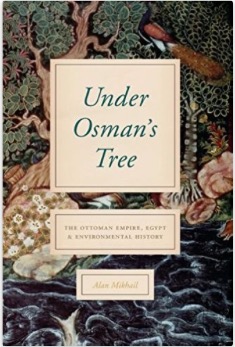现代的中东早期是世上最重要的连接及互动区域。因此,鄂图曼多样的环境也和全球贸易、气候和疾病互相影响。作者Alan Mikhail 从埃及运河的泥巴中往上讲到小亚细亚的树梢,解析了中东环境史的主要面向:自然资源管理、气候、人/动物劳动力、能源、水管理、疾病和政治。他也点出鄂图曼帝国主要宗教伊斯兰教了解及与自然世界连结的方式。《奥斯曼的树》结合了环境和鄂图曼的历史,为这段持续了500年的中东史提供了一个大胆的新诠释。
本书好评
“Certainly the best work ever on Ottoman environmental history. Brings the Middle East into the global picture in as comprehensive a way as can possibly be imagined.”
(Roger Owen, Harvard University)
“This is an outstanding book, carefully written and timely. Mikhail has brought the tools of environmental history to bear in this fresh telling of Egyptian, Ottoman, and Middle Eastern history. He focuses on the last five hundred years, after Egypt became the crown jewel of the Ottoman Empire, and masterfully embeds his history into the complex ecologies surrounding the Nile River, an enduring source of both life and cruel natural disasters. With thoughtful thematic categories driving his analysis, Mikhail makes an important contribution not just to Middle Eastern history, but to how a new generation of historians must view the relationship between people and the changing face of our planet, particularly during the new uncertainty of the Anthropocene Epoch.”
(Brett L. Walker, Montana State University)
“Focusing on early modern Egypt, Mikhail puts power and knowledge in the Ottoman Empire in conversation with environmental relations—the movement of water, the accumulation of silt, the distribution of food, the need for wood for ships, the spread of disease, the possession and use of animals as sentient commodities, climatic fluctuations, and fundamental changes in the organization of human and animal labor. The result is a reinterpretation of the Ottoman Empire as an ecosystem that expands the possibilities of environmental history.”
(Richard White, Stanford University)
“With this rich and accessible study of the relationship between human communities and their natural environment in Ottoman Egypt, Mikhail offers us an original interpretation of Ottoman history. Rarely does a new book make us rethink completely our assumptions about a subject matter we think we know well. Under Osman’s Tree does precisely that, and as such it is a worthy successor to Fernand Braudel’s magisterial classic, The Mediterranean.”
(Resat Kasaba, University of Washington)
关于作者
Alan Mikhail 是耶鲁大学的历史教授。他是The Animal in Ottoman Egypt and Nature and Empire in Ottoman Egypt: An Environmental History 一书的作者及Water on Sand: Environmental Histories of the Middle East and North Africa的编辑。





